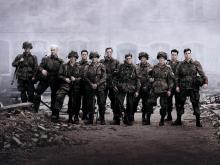I’m pretty ambivalent on taking a liberal approach to recreating historical events on film or in books. It’s a difficult question and one that really has no answer. There are two questions relevant to any interpretation. The first being is it better for people to have a inaccurate representation, an interpretation rife with literary license? Or, is it better for the common man to know nothing about a historical event at all, to live a life in which he isn’t aware that this event even happened? This is a conundrum that has to come to anyone with an interest in representing historical facts in a way that is commercially viable and presented with a want to appeal to consumers.
I often think about this question when I read popular history books or watch any type of historical movie. I took quite a few history classes in colleges and the professors always warned us to be skeptical of this type of document. It wasn’t that they weren’t accurate—although they often are fabricated to the point of inauthenticity—it is that the writing comes with an eye for drama, a willingness to emulate the novel, so, to these professors at least, it isn’t really history.
And I agree, sometimes it’s difficult to take these popular histories as fact. I’ve read several of Erik Larson’s books and he uses quotes and anecdotes so liberally that it’s impossible not to wonder how he so precisely links dialogue (which he quells from real letters, journals or autobiographies) to the instance when the dialogue was supposed to occur.
In addition, it can be difficult to trust some of these types of books because you know that they are designed to appeal to consumers, so they have to be milked for the greatest dramatic potential. For example, in Stephen Ambrose’s Band of Brothers, he relies on a word-of-mouth account about a soldier’s death, but the soldier didn’t die for another 20 years after the account published in his book or the subsequent TV miniseries. Did his death add dramatic intensity? Certainly, but perhaps this want for dramatic intensity causes such scholars to be careless in their accuracy because they so want the most dramatic alternative to be the truth.
But then I think of a lot of the history texts I was assigned to read in college. First, they are often dry and dense. Second, they are written in a way that only historians who know a specific jargon can enter the conversation. And I don’t think that this should be the point either. Dramatic potential shouldn’t be the aim, no, but neither should creating documents only accessible—or available—to the select few completing history degrees.
What do you think is the solution?
